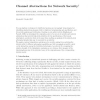15 search results - page 3 / 3 » mscs 2008 |
MSCS
2008
13 years 7 months ago
2008
Subtyping for inductive types in dependent type theories is studied in the framework of coercive subtyping. General structural subtyping rules for parameterised inductive types ar...
TOPNOC
2008
13 years 7 months ago
2008
Message Sequence Charts (MSCs) are a well known language for specifying scenarios that describe how different actors (e.g., system components, people, or organizations) interact. M...
MSCS
2008
13 years 7 months ago
2008
Abstract. Software security can be ensured by specifying and verifying security properties of software using formal methods with strong theoretical bases. In particular, programs c...
MSCS
2010
13 years 6 months ago
2010
Abstractions for Network Security† MICH E L E B U G L I E S I, R I C C A R D O F O C A R D I Dipartimento di Informatica, Universit`a Ca’ Foscari, Venice. Received 6 October 20...
RTAS
2008
IEEE
14 years 1 months ago
2008
IEEE
Message Sequence Charts (MSCs) are widely used for describing interaction scenarios between the components of a distributed system. Consequently, worst-case response time estimati...

